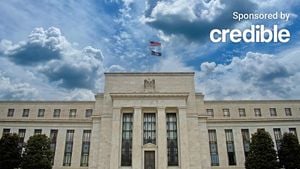Stock markets took notice when Brian Thompson, the CEO of UnitedHealth Group, was tragically shot and killed last week. The incident sent shockwaves through the financial world, resulting in significant declines for the stocks of major health insurance providers, including UnitedHealth Group, Cigna, and Elevance Health. The overall investor sentiment turned cautious, leading to nearly 11% drop for UnitedHealth Group, as well as declines across others within just days following the event.
Thompson’s assassination has drawn the public’s attention not just to the high-profile nature of the crime but also highlighted underlying tensions surrounding the U.S. healthcare system. Critics have rallied online, generating a swell of anti-healthcare sentiment, particularly against insurance companies' practices which many claim prioritize profits over patient care. This growing wave of criticism surfaced after investigators identified the alleged shooter as Luigi Mangione, said to be vocal about his grievances with the health insurance industry.
Thompson was fatally shot outside his hotel, where he was attending meetings related to healthcare policy. This shocking nature of the shooting has reignited discussions about the healthcare system's inequities and failures to provide sufficient care. And as these conversations proliferate, they seem to suggest not only collective anger but also hints of vindication for those who have felt let down by their insurers.
Shortly after the incident, health insurers saw their market values take hits. UnitedHealth opened trading at $610.79 the day of the shooting but plummeted almost to $537.82 within just one week. Similar declines followed for Cigna and CVS Health, recording liabilities of around 12% and 11%, respectively. Centene Corp and Humana weren’t spared either, with dips of 5% and 3%. Industries are now examining the likely ramifications these stock market movements could have.
Analysts attribute these share price declines to renewed scrutiny placed upon insurance companies following Thompson's death. Jared Holz, a strategist at Mizuho Financial Group, commented, "I think the response from investors has been, ‘Do we want to own this category of stocks if there’s going to be this now renewed negative focus on the industry?’" This hesitance reflects fears of future regulation or public backlash aimed at insurance companies as anger continues to simmer among consumers.
To compound the recent turmoil, lawmakers are already proposing new regulations targeting the practices of pharmacy benefit managers (PBMs)—intermediaries between insurers and pharmacies. Senators Elizabeth Warren and Josh Hawley have introduced legislation to divest insurers and PBMs from their pharmacy businesses within three years, which could reshape operational strategies. This could potentially limit their income sources amid already rising expenses.
Despite passing scrutiny, some industry experts believe these turbulent responses may be temporary. Michael Cherny from Leerink Partners stated, "The latest introduction of potential legislation to restrict PBM operations and broader healthcare vertical integration is unlikely to gain traction.” Still, the outreach from consumers does signal the public’s willingness to hold corporations accountable for their service decisions.
Criticism related to health insurance isn't entirely new; complaints about high medical expenses, surprise billing practices, and denied claims have long overshadowed the industry. It’s estimated nearly 15% of medical claims made to private insurers are initially denied, leaving patients to navigate complex appeals just to get the necessary care they require.
The negative spotlight on healthcare insurance could also signify longer-lasting shifts in public perception and policy. With Thompson's murder prompting discussions around profit-driven motives viewed as predatory, community sentiment has driven people to voice their grievances widely on social media. A growing movement to expose insurance pitfalls has emerged, linking this event to long-standing discontent widely felt among Americans burdened by healthcare costs.
Investors are now left reassessing their positions like never before. Amid all these changes, many are considering the potential need for insurance companies to even reevaluate how they manage their coverage decisions moving forward. Julie Utterback, analyst at Morningstar, noted, "The anti-insurer sentiment expressed by the public after this event suggests UnitedHealth and potentially the industry need to adjust their strategies related to coverage to improve their standing with consumers."
.



